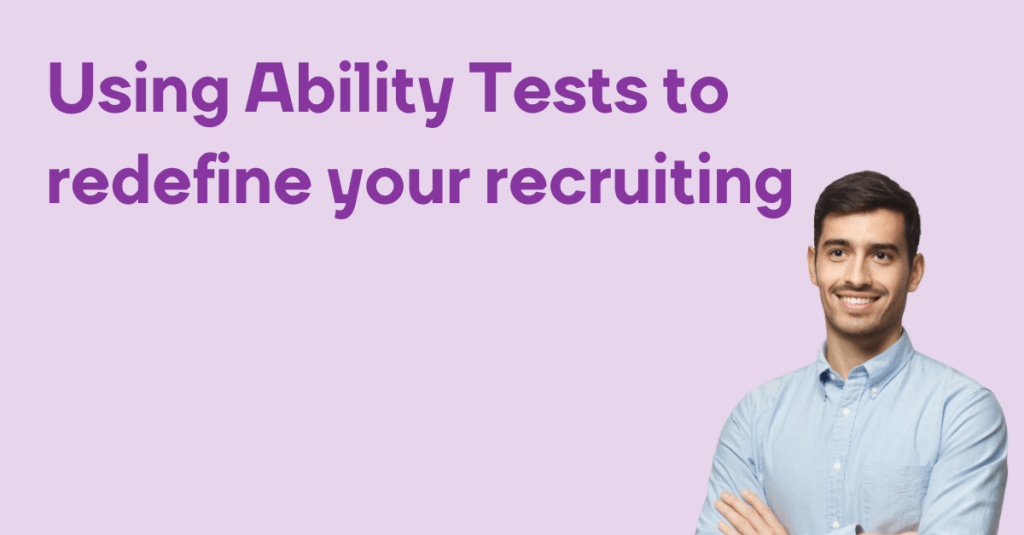
What are Ability Tests?
Ability tests (also called cognitive ability tests) are a standardised method of assessing an individual’s performance in various work-related tasks or situations. These types of tests measure a candidate’s potential cognitive ability, offering valuable insights into how they process information under time constraints. This capability is a strong predictor of job performance.
Designed to be candidate-friendly and relevant to the work environment, Clevry’s ability tests adapt to diverse needs, ensuring fairness for all candidates. The psychometric rigour of these assessments guarantees high reliability and validity, providing a comprehensive picture of an individual’s capabilities in the workplace.
Why measuring ability matters
Cognitive ability, often referred to as aptitude or critical reasoning, plays a significant role in job performance. This encompasses various mental skills, including problem-solving, logical reasoning, and the capacity to understand complex concepts. Employers use cognitive ability tests to assess how well candidates can handle the intellectual demands of their roles.
These tests are particularly effective in predicting performance in positions that require quick thinking and effective decision-making. By evaluating cognitive ability, employers can identify individuals who are likely to thrive in dynamic and challenging environments.
Types of Ability Test
Clevry offers several types of ability tests, each designed to measure specific aspects of a candidate’s skills and potential:
Numerical Ability Test:
These assess a candidate’s proficiency in manipulating and understanding numerical data, including basic arithmetic, averages, percentages, and ratios. For example, roles in finance often employ these tests to ensure candidates can handle complex calculations.
Verbal Ability Test:
These evaluate a candidate’s capacity to understand, analyse, and interpret written information, crucial for roles requiring strong communication skills.
Abstract Ability Test:
These measure an individual’s general intellect and ability to work with new concepts or ideas, often using non-verbal, multiple-choice questions.
Checking Ability Test:
These assess attention to detail and the ability to spot errors in written information quickly and accurately, vital for roles where precision is key.
Mechanical Ability Test:
Designed for positions that require an understanding of basic principles of physics and mechanical devices, these tests evaluate a candidate’s practical skills and knowledge.
Benefits of using Ability Tests in hiring
Incorporating ability tests into the hiring process offers several advantages:
- Objective evaluation:
Ability tests provide a more objective measure of a candidate’s potential, significantly reducing the risk of bias and unfairness. This results in a more equitable hiring process, where candidates are assessed based on their abilities rather than subjective criteria.
- Streamlined recruitment:
By quickly identifying the most suitable candidates, these tests save time and resources for employers. This allows for a focus on candidates who are more likely to succeed in their roles. Moreover, the tests can be administered online, making them convenient and accessible for both employers and candidates.
- Enhanced candidate experience:
Designed to be engaging and relevant, ability tests provide a low-stress experience for candidates. This is crucial for enabling them to perform at their best without being hindered by anxiety. Candidates also receive valuable feedback from these tests, offering insights into their strengths and areas for improvement.
Actionable implementation of Ability Tests
To effectively implement ability tests in your hiring process, consider the following steps:
- Select appropriate tests:
Identify the specific skills and abilities critical for success in the role you’re hiring for. Choose tests that accurately measure those attributes.
- Ensure fair administration:
Administer the tests fairly and consistently. Provide clear instructions and support for candidates, and use standardised scoring methods to evaluate results.
- Gather candidate feedback:
After the testing process, collect feedback from candidates to continuously improve the test experience. This can help refine the process and make it more candidate-friendly.
Ability tests are a powerful tool for transforming the hiring process. They provide objective, reliable, and valid measures of a candidate’s potential, empowering employers to make informed hiring decisions. By integrating these tests into your recruitment strategy, you can enhance fairness and efficiency in your hiring practices, leading to better outcomes for both employers and candidates.
As the shift towards skills-first hiring continues, ability tests will play an increasingly important role in identifying and developing talent. Embrace these assessments to ensure you select candidates who possess the cognitive abilities and potential to excel in their roles, ultimately contributing to your organisation’s overall success.



